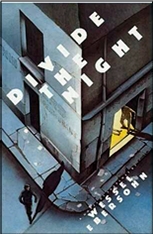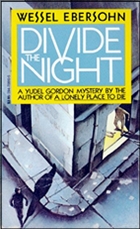Tue 5 Mar 2024
A 1001 Midnights Review: WESSEL EBERSOHN – Divide the Night.
Posted by Steve under 1001 Midnights , Reviews1 Comment
by Newell Dunlap & Bill Pronzini
WESSEL EBERSOHN – Divide the Night. Pantheon, 1981. Vintage Books, softcover, 1982.

It must be strange to have one’s books banned in one’s own country, but such is the case with Wessel Ebersohn, a native and resident of South Africa who records that society as he sees it, blemishes and all. Consider his description of Johannesburg’s citizens:
“There were the super-liberals who almost felt ashamed to be white. There were the most violent and desperate racialists who would willingly kill to protect a position of privilege. There were artists and railway workers, Jews and anti-semites, nuns and whores, millionaires and the dispossessed …”
Divide the Night is an intelligent and provocative novel featuring Yudel Gordon, a prison psychologist who also treats private patients. One such patient is a man named Johnny Weizman, who has the rather antisocial habit of leaving his storeroom door open all night and shooting any intruder — usually blacks, of whom he has already killed eight. As far as Yudel is concerned, Weizman is a fanatic and psychotic racist; the Special Police, however, consider him a patriotic citizen, and are much more interested in a fugitive black leader named Mantu Majola who witnessed Weizman’s last murder and who just might (the security police hope) return to settle the score with the racist shopkeeper.

Caught up in the middle is Yudel, who has troubles of his own-primarily a nagging wife who feels he does not have the proper attitude toward money. Yudel is a highly sympathetic character, well drawn and very human. Similarly, Ebersohn’s other characters come across as real people, which makes us care about the things that happen to them in, and as a result of, the restricted society in which they live.
The New York Times Book Review called Divide the Night “a powerful book and a well-written one that just happens to fall within the genre of the police procedural.” The same could be said of the first Yudel Gordon suspense novel, A Lonely Place to Die (1979). Also impressive is Ebersohn’s non-series suspense novel, Store Up the Anger (1980).
———
Reprinted with permission from 1001 Midnights, edited by Bill Pronzini & Marcia Muller and published by The Battered Silicon Dispatch Box, 2007. Copyright © 1986, 2007 by the Pronzini-Muller Family Trust.
March 8th, 2024 at 10:30 pm
An interesting book in that it shows a society where doing the right thing and telling the truth is likely to have deadly results.